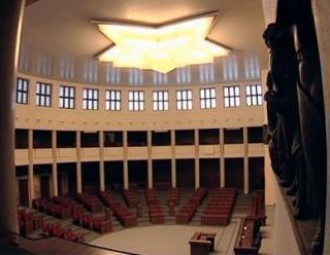Point of view: Minsk hopes for limited recognition of new parliament by EU

Minsk shows readiness for a dialog with the EU in the parliamentary dimension. As the travel ban on Lukashenka was lifted, he is no longer regarding parliamentary cooperation as a threat to his rule.
This, however, does not mean that the Belarusian government is ready to allow the opposition in the parliament, rather hopes for a loyal attitude of the EU to the new Parliament.
Last week, the House of Representatives hosted a round table on electoral standards and improving the electoral process in Belarus.
Recently, Minsk not only has boosted official contacts with Western capitals and European institutions on electoral issues, but also regarded the possibility to organise events with the participation of European and Belarusian parliamentary structures in Belarus. The Belarusian regime considered inappropriate that the Belarusian parliament resumed contacts with the EU before the president did so. Incidentally, now that the ban on Lukashenka and the government contacts with the EU has been lifted, the parliamentary interaction is no longer regarded as a threat to the presidential power.
For instance, Belarusian parliamentarians, the Central Election Commission members, independent human rights defenders from the Belarusian Helsinki Committee, opposition leaders Tatsiana Karatkevich and Andrei Dzmitryeu from Tell the Truth! campaign took part in the round table with the PACE and EU delegations held in the House of Representatives in Belarus. The round table addressed the changes in the election rules and the likelihood of interaction between the PACE and of the National Assembly.
In addition, the Belarusian centre-right opposition coalition in Minsk organised a joint roundtable with MEPs from the European People’s Party (EPP), which was attended by most Belarusian oppositional party leaders. The European Parliament delegation also met with the Central Election Commission leadership to discuss the parliamentary campaign. It is worth noting that thanks to the EPP leadership, in late 2015 the centre-right position coalition was established in Belarus.
As the parliamentary cooperation with the EU resumes, the Belarusian authorities demonstrate to Western capitals their greater openness to a dialogue with the opposition and civil society. Simultaneously, Minsk reserves the right to choose partners among the opposition for participation in the Belarusian-European dialogue.
In all likelihood, the authorities aim to enhance the fragmentation and conflicts among the opposition groups before the election campaign starts. By doing so, the authorities seek to significantly reduce the opposition’s influence on the Belarusian-European agenda.
Meanwhile, the promotion of parliamentary contacts is unlikely to increase the authorities’ readiness to risk during the upcoming elections to the National Assembly. CEC head Yarmoshyna emphasised that of the 30 proposals by the OSCE/ODIHR, 22 require constitutional and law amendments. The Central Election Commission said that it would attempt to take into account the recommendations of international organizations when preparing handbooks for the members of the election commissions. The authorities are likely to apply micromanagement in the upcoming parliamentary campaign and in liberalising social and political life, which will depend on the pressure from Western partners, the opposition activity and the growth of protest manifestations in society.
The Belarusian government is aspiring for partial recognition of the new Parliament by the European institutions, however without changing the fundamental rules.
-
03.01
-
07.10
-
22.09
-
17.08
-
12.08
-
30.09








































